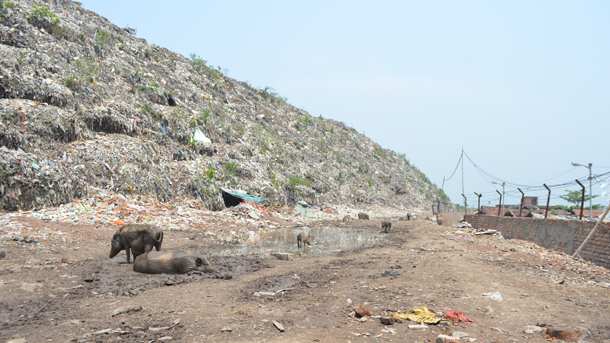KOLKATA, India — Brand-name multinationals such as IBM and Vodafone have offices nearby, and a five-star Marriott hotel is going up on the main airport road in eastern Kolkata, not far from pricey pastel apartment blocks looking like Legoland in the hazy sun-baked distance.
Half-built condos encased in scaffolding are shooting up all over this part of town, to be serviced by a new metro line linking to the airport. But a mile or so away from the Marriott site is Kolkata dhapa, or rubbish dump—a vast, decades-old hill of plastic, rubber, tin and old clothes—perhaps four to five hectares in area and 18-20 meters high.
Since free-market reforms in 1991, Asia’s third biggest economy has grown 7-8 percent per annum. However, despite this growth and the emergence of a middle class numbering in the hundreds of millions, India still has hundreds of millions of poor living on the equivalent of a dollar or less a day. Beside the dump, several hundred low-caste migrant villagers live in shacks, squeezed between the towering mound of rubbish on one side and a mosquito-spawning lake on the other.
A recent fall-off in quarterly growth from an average of 8 percent to an almost-decade low of 5.3 percent has spurred fears that India will not be able to raise living standards for these vast numbers of poor. Twenty years on, India’s rich-poor contrasts are concentrated into a jarring proximity in vast cities such as Kolkata, where the squalor beside the dump is only a couple of kilometers from a fast-paced construction and gated luxury.
Now West Bengal’s hot, dry season is coming to an end and each day starts and ends with a brief but tumultuous downpour, the ambers and oranges of the dawn and dusk skies lit momentarily by nature’s neon forks just before the monsoon thunder shakes the vast city, fading even the din of Kolkata’s swirling traffic into the background. During the hours between, the temperature hits 40 degrees and humidity ranges between 60-80 percent. Schools are closed in most places due to a heatwave that has killed dozens across Kolkata in recent days.
At the dhapa, pigs wallow and snort languidly in the fast-receding rainwater puddles at the dump entrance. Just outside the gate, migrants from Jharkhand and Bihar, two agrarian states in eastern India, fetch water before it gets too hot.
In the afternoon, the pre-monsoon heatwave will dry the handfuls of dung and earth paste slapped onto the wall dividing the village from the refuse heap, setting the fly-strewn paste into hardened clumps which come evening are set alight to cook evening meals amid the stench and filth.
There is clean water and toilets, however, supported by Irish non-governmental organization GOAL. India country director John Wain says these facilities are vital for marginalized communities. “These are people on the fringes of society, who have limited access to government facilities,” he says.
But otherwise, why would anyone live in such a place, so close to where Kolkata’s millions dump their rubbish? Ranjit Adhikari of Kotalipara Development Society—a Bengali NGO—answers: “The people here work on the rubbish ever day, to collect some iron, some plastic and bring to local markets or local businessmen.”
dhikari works across the Hooghly River and the mammoth Nivedita Setu, an imposing and impressive 880-meter-long cable-stayed bridge opened in 2007. Speaking at a school in the shadow of another mammoth dump in Howrah, he describes a similar sight to the Kolkata dhapa, where the rubbish is broken and chopped up, melted, remoulded, and repackaged for onwards sale—recycling to make ends meet rather than to meet environmental laws.
It’s a grim yet vital trade for families who often have no other income—though some fathers find seasonal or transient work as day labor in Kolkata. “We earn between 120 and 200 rupees [US $2.15-3.60] per day,” says Ranju Gupta, a 12-year-old who divides her time between school and working on the sun-baked refuse mountain. “We collect between 7 am and 9 am, then we have class.”
Further inside the village, Sabita Paswan’s back yard is full of rubbish—five to six tonnes of it gathered up by neighbors and then bought by the Paswan family, who sell the neatly sorted refuse on to businesses in Kolkata. “We pay 20 rupees per kilo for iron and 15 per kilo for plastic,” she says, refusing to tell how much the unlikely treasure is sold on for.
Back across the river in Kapali Bagan, a grimy Kolkata slum, some of the rubbish from Kolkata dhapa and Howrah comes in 1.2-meter-high, 1.8-2.4-meter-wide canvas sacks. Inside one-room shacks, doors ajar onto the streets, it seems everyone is sifting rubbish. Shirtless wizened old men—their skin leathered and faces lined and gnarled by decades of toil—sit alongside family while going through filthy scraps of plastic and rubber, and iron, sorting by color, size, and weight with the eye of a gem trader handling Burmese rubies.
It’s a notch on the refuse-recycling chain above the villages beside the dumps—but slums like Kapali Bagan are not for the fainthearted. Squatting on the rusty railings of a rickety old bridge linking two parts of the slum, children and adults relieve themselves into the canal water below, already a sludgy mess of refuse and offal from animals being slaughtered nearby.
“The main problem is still the water,” says MD Kallu Rahi, a long-bearded district elder in Kapali Bagan. “Because of that people get sick and get skin problems.”
Making the slum “open defecation free” is part of GOAL’s work to improve health and sanitation in the area, says John Wain. “It will be a tall order though,” he says, as “there is little or no room in such crowded slums to build toilets.”

















